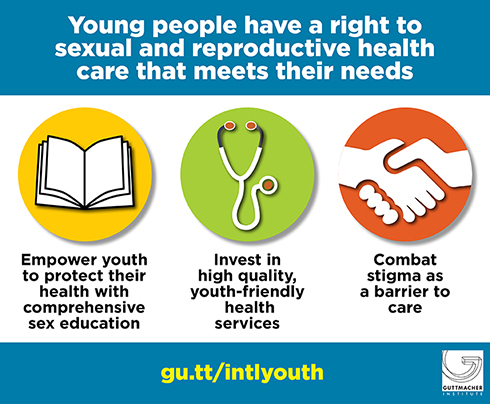Throughout developing regions, many adolescent women struggle to get the sexual and reproductive health information and services they need, according to a new Guttmacher report that analyzes national health surveys and published research findings from 70 countries across Africa, Asia, and Latin America and the Caribbean. The report’s release comes just in time for International Youth Day (Aug. 12), which aims to bring global attention to young people’s most pressing concerns and increase youth involvement in decisions that affect their lives.
The report, Adolescent Women’s Need for and Use of Sexual and Reproductive Health Services in Developing Countries, examines a range of sexual and reproductive health indicators for women aged 15–19. The authors found the following:
- Adolescent childbearing is common in developing countries, and it carries serious risks. The proportion is lowest in Asia (averaging about 10%) and highest in Africa, where the proportion is 20% or higher in two-thirds of countries. Adolescent mothers are more likely than those who are older to suffer a variety of poor health outcomes related to their pregnancies, from obstructed labor to tearing of the birth canal. Globally, complications of pregnancy and childbirth are the second leading cause of death among adolescent women.
- Early marriage remains widespread in developing regions, but varies greatly by country. For example, in most of Asia, fewer than 20% of adolescent women have ever been married, but proportions are much higher in Bangladesh (46%), Nepal (29%) and India (28%). Early marriage threatens young women’s health and rights, for instance by exposing them to the risks of early childbearing and interrupting their education.
- In 35 of the 50 developing countries for which data are available, at least 45% of unmarried, sexually active adolescent women have an unmet need for contraception.
- Most adolescent women experiencing an STI or STI symptoms do not get care from a health facility. The proportion not receiving care is higher in Africa and Asia than in Latin America and the Caribbean.
- The proportion of adolescent women who are sexually active varies greatly by region. In most countries in Africa and Latin America and the Caribbean, 10–50% of unmarried adolescent women report being sexually active. In the few Asian countries where such data are gathered, the overwhelming majority of unmarried adolescent women report that they have never had sex.
- An estimated 3.2 million adolescent women in developing regions underwent unsafe abortions in 2008. Adolescents cite cost, a desire to keep the abortion secret and difficulty locating a safe provider as their main reasons for seeking unsafe or self-induced abortions.
The report provides recommendations for policy and programmatic strategies that could significantly improve sexual and reproductive health services for adolescents in developing regions: involving youth in planning the programs and policies designed to serve their unique needs, providing them with accurate and effective services and information, and addressing the barriers that young people face when trying to gain access to sexual and reproductive health care.
One common barrier is social stigma, which discourages young people in many countries from openly seeking services and discussing their needs. In addition, some adolescents cannot afford to pay for services or contraception, or fear policies requiring parental consent before they can receive services.
"Young people have the right to make informed decisions about their lives—but to make that right a reality, they urgently need high-quality sexual and reproductive health services," says Susheela Singh, vice president for research at the Guttmacher Institute and a co-author of the report. "We can provide much better care and education by listening to adolescents and by working to overcome the social, legal and practical barriers they face."
The report utilizes data from 35 countries in Africa (representing 79% of the population of that region), 22 in Asia (51% of the population) and 13 in Latin America and the Caribbean (74% of the population).
